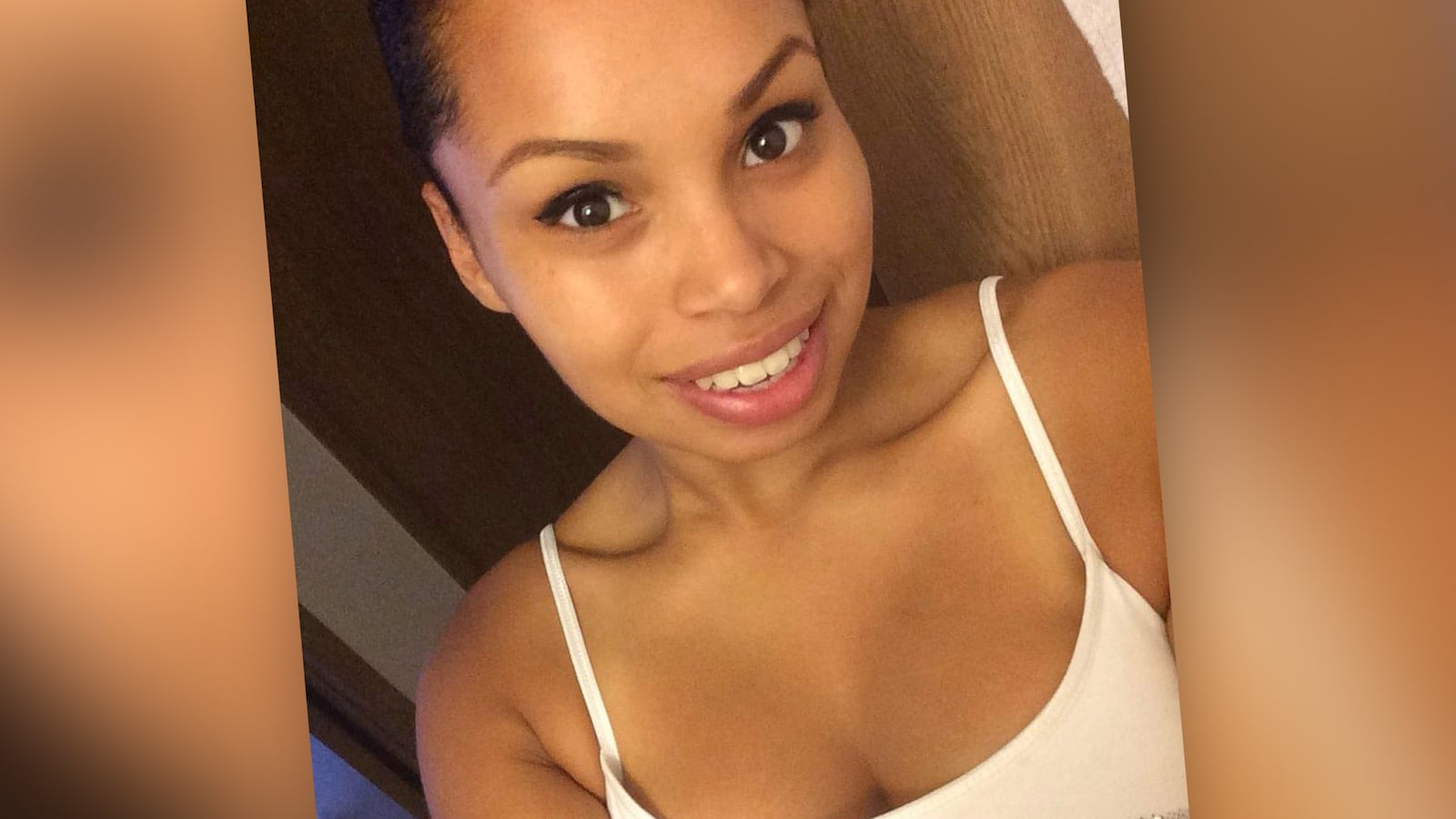SEATTLE—When T.J. Molina approached King County Sheriff’s Patrol Deputy Nicholas Pritchett on a Friday evening in 2016 on the Muckleshoot Reservation in Washington state, he just wanted some help.
That day, he and his pregnant partner, Renee Davis, both members of the Muckleshoot Indian Tribe, had been planning to pick up a crib and clothing for their child, who was due in just a few months. But before they left, Molina said he took a nap and Davis, 23, became annoyed and told him to leave. The situation spiraled once he was out of the house, and at 6:14 p.m., Davis texted him a photo of what appeared to be at least one large cut on her body.
She also sent the words: “Well come get the girls or call 911 I’m about to shoot myself.”
Molina raced for assistance, as he was looking for someone he could explain to in detail what had happened. That’s when he saw Deputy Pritchett at the tribe’s powwow grounds—the tribe receives some law-enforcement help from the Sheriff’s Office. He remembers rushing to describe how worried he was for Davis and their unborn baby.
When asked if Davis had any weapons, Molina said he explained that she’s a hunter, so she had firearms.
“I thought, ‘OK I’m going to go over here, talk to him real quick, see if he can just go run over there, knock on the door, see if she’s OK, that’s all,’” Molina, now 37, told The Daily Beast during a recent phone interview.
Instead, according to an inquest hearing in 2017, within 62 seconds of Deputy Pritchett and Patrol Deputy Timothy Lewis reporting that they entered Davis’ home on Oct. 21, 2016, they fatally shot Davis. A half-Black and half-Native mother of three who was pregnant with another child, Davis was struck in her shoulder, thigh, and chest. Officers said that after they entered her bedroom, she raised what they later learned was an unloaded pistol and made them fear for their lives, while some who were close to Davis said there’s no evidence she threatened them.
In King County, inquests are used to determine the causes and circumstances of deaths that involve a member of law enforcement, and aren’t meant to decide if an individual is civilly or criminally liable, though they could influence that decision. No criminal charges were ever filed in the case.
Over the past four years, Davis’ family, her legal team, and others close to her have condemned how officers—one of whom, Pritchett, was familiar with Davis and had been to her home as many as four times—handled responding to a distraught pregnant woman. The frustrating pursuit of justice came to a head in 2020, a year that saw widespread protests against police brutality and racism, prompted in part by the killing of 46-year-old George Floyd in Minneapolis.
Davis’ 30-year-old sister, Rose, said she hoped the movement would help right what went wrong for her own sister, whose killing was not captured on video like some of the most notorious incidents to rock the national consciousness.
After a slew of setbacks in court over the last two years, it hasn’t played out that way.
A spokesperson for the King County Sheriff’s Office said the agency and its members would not be commenting on the shooting, but confirmed that both deputies still work for the agency.
In an email, Ted Buck, an attorney representing both Deputy Lewis and Deputy Pritchett, told The Daily Beast that, “as community caretakers, the deputies’ response was appropriate—investigate Ms. Davis’ condition and commence life-saving steps if necessary.”
“Had they waited for other first responders, Ms. Davis may well have bled out,” he continued. “They could not wait for a ‘mental health team’ because none existed. They faced the choice of trying to ascertain her condition and potentially save her life or sit back and risk letting her die.”
“When the deputies faced not a wounded, potentially dying person, but rather someone pointing a semiautomatic pistol at them, they had two choices—defend themselves or hope she didn’t kill them,” Buck added.
According to her sister, lawsuits, and Deputy Pritchett’s testimony during the wrongful death lawsuit proceedings, Renee Davis was a survivor of past domestic abuse who had dealt with depression. She was home alone that day with her children aged 2 and 3. Deputy Pritchett said during the inquest that he did not remember being told by Molina that Davis was pregnant, but that he did consider her possibly a “suicidal female.”
“[Officers] were banging on the doors and banging on the walls and stuff,” Rose Davis told The Daily Beast. “Her having survived domestic violence and things that trigger her—even just a man’s voice or how tall they are, you never know what could trigger them, so it’s probably not the best idea to have two men respond to her being in her state of mind.”

Lawsuits over the incident has been dismissed or else languished in court, in part thanks to a 1986 Washington state law barring wrongful death lawsuits if the individual dies while committing a felony. In Renee Davis’ case, that felony would have been aiming a gun at law enforcement officers.
Rose Davis has since filed a motion for reconsideration, arguing “the Court overlooked and misapprehended the law.” At the same time, Ryan Dreveskracht, an attorney for the Davis family, said they want that 1986 state law changed so that it excludes law enforcement.
“If you are negligent in a way that provokes a response that results in someone’s death, then you’re accountable for that, or you need to be held accountable for that,” said Dreveskracht. “But what this statute does is it says as long as you created the situation where someone committed a felony, then there’s [a] complete bar. Then it’s just disincentive to act reasonably.”
In addition to the wrongful death suit at the state level, the family is seeking redress by way of federal litigation citing the Fourth and 14th Amendments, though that suit is on hold until appeals of the wrongful death suit are exhausted.
If the legal path to accountability in what the family describes as a gross failure of law enforcement is a fuzzy one, the facts of the case are harrowing.
Neither officer was wearing a body camera. But video footage from outside Davis’ home—obtained by The Daily Beast via a public records request—along with statements made by both deputies during the inquest hearing show the deputies arriving at the single-story house, pounding on the door and siding, and yelling to identify themselves. Deputy Lewis had his gun out, and in one instance pulled the screen off of a window.
They were eventually let in by one of Davis’ young daughters, who the officers said they directed to the porch outside the house.
Deputy Pritchett said during the inquest that he eventually broke the child lock on Davis’ bedroom door and found her lying in bed, covered in a blanket. He said he pulled it off because, “We didn’t know if she had weapons. We didn't know if she had severe injuries that she was potentially succumbing to.”
They reported finding her holding a pistol in her right hand and a pistol magazine in her left, according to the hearing. The officers said she raised the gun, and they fired eight shots, striking her three times.

Before falling to the side of the bed, Deputy Pritchett recalled Davis looking up and saying something like, “It wasn’t even loaded.” And it wasn’t.
As with many police killings of people of color, questions swirled about how and whether the officers attempted to administer aid after the shooting. Dimitri David Rodriguez, a volunteer with Mountain View Fire and Rescue, reported during the inquest that when he arrived at the house, no one was administering CPR to Davis. He said she didn’t have a pulse, but was having agonal respirations, which is “where you are trying to breathe but nothing is happening.”
Deputy Pritchett explained during the inquest that he didn’t attempt any lifesaving measures because by the time he’d started to move her to the middle of the floor, the fire department was arriving. Deputy Lewis said during the inquest that after the shooting he checked on the children, and then yelled for medics, who he knew were nearby.
The state lawsuit also brought up questions about why a third officer, who arrived at the scene after the two deputies, reported finding a gun in Davis’ hand after she was shot, while Deputy Pritchett said during the inquest that Davis left it on the mattress. The lawsuit alleges: “Upon information and belief, one of the Deputies placed the pistol in Renee’s hand on the floor prior to Officer Pedersen’s second return to the house.”
However, all six members of the inquest jury ultimately determined that when the deputies fired their guns, they believed they were in serious danger. This even though three of them reported not believing the deputies were concerned with Davis’ welfare when they saw her in her bedroom.
Davis had a history with the agency in question. According to a King County Sheriff’s follow-up report on Davis’ death, she was “involuntarily committed for a mental evaluation after making suicidal comments” while pregnant with her first child.
Still, before her death, her close friend, Rose James-Arzate, said she seemed to be doing well.
The pair were teaching at a Head Start preschool program, and had recently been offered permanent positions, which James-Arzate recalled Davis being very excited about. Davis was also pursuing a teaching certificate.
“Everything was good,” James-Arzate told The Daily Beast. “She got her house. She just got her truck. She was in a good place. But then there was also little things, you know, like her truck was starting to break down—that was kind of stressful.”
That Friday, the friends had spent the morning decorating their classrooms for Halloween. By midday, they went out for lunch at the Muckleshoot Bingo hall. James-Arzate, who was also pregnant at the time, remembers them talking about the ultrasound Davis had just had and her desire to have a boy, who she planned on naming Massi.
“She did grow up having a hard time. We all did, but she turned it around,” added her sister Rose. “And she took the step to healing that intergenerational trauma that our community currently suffers. And you can see it in her girls in how strong they are, how resilient they are.”
Crisis calls and how law enforcement respond to them have been a sticking point amid the nationwide reckoning over police violence. In recent months, San Francisco took steps to remove police from most behavioral crisis calls, while Albuquerque moved to add a whole new department of first responders to handle such things as mental-health emergency calls. And in Olympia, Washington, some 911 calls are responded to by “crisis responders,” rather than cops.
It’s an approach Renee Davis’ sister thinks needs to be tried more widely—and fast.
“I’d like for specifically for crisis calls if there was to be a plan and maybe have the cops on standby and to have a mental health person or a mental health group or a team to go up and approach the situation,” she told The Daily Beast.
Rose Davis, who has been raising two of Renee Davis’ children, said the immediate aftermath of the shooting has had a palpable effect on their lives. During a family night last spring, Brooke, the older of the two, told the group, “This is what my mom looked like after they hurt my mommy,” before suddenly lying on the ground, limp, Davis recalled.
When asked what she remembers of that night, Rose Davis said she knows she rushed to her sister’s home, answered officers’ questions and cried. But that’s about it.
“I don’t remember a lot,” she said. “My brain likes to hide things away like that because it doesn’t have room for any more pain.”



